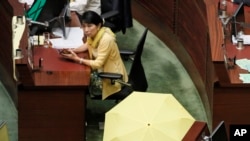Hong Kong has taken the first steps in criminalizing disrespect of China’s national anthem in what critics say is a bid to stem political criticism in the semi-autonomous Chinese city.
A bill is currently before the legislative council, Hong Kong’s quasi-democratic legislature, that will hand down three years of jail time and a fine of around $6,300 for “publicly and intentionally [insulting] the anthem in any way” or using it for commercial purposes.
It also states that primary and secondary school students must learn to sing the anthem as well as its “history and spirit.”
The bill passed its second reading in late January and is expected to become law later this year, following in the footsteps of a similar law Beijing enacted in 2017.
Soccer fans
Hong Kong’s Constitutional and Mainland Affairs Office said by email that the purpose of the new law “aims to preserve the dignity of the national anthem and to regulate the playing and singing of it.”
“March of the Volunteers,” the national anthem shared by Hong Kong, China and Macau, became the focus of much public hostility in 2015 following the failure of the city’s Umbrella Movement democracy protests the previous year.
Local soccer fans regularly booed the anthem during important matches, many of which were aired on national television in China.
The booing has continued sporadically since then and is seen as a reflection of many residents’ mixed feelings for Beijing and the local government.
Penalties in other countries
Despite the national anthem controversy in Hong Kong, a number of countries around the world have penalties related to desecration of the flag or anthem including Greece, Spain, France and Germany in Europe and Singapore, Malaysia and Thailand in Asia.
The U.S., Canada, Australia and the U.K. , conversely, do not have any penalties, according to Freedom House, a U.S.-based organization that monitors freedom of speech around the world.
In many cases, however, laws relating to the national anthem or flag are not “aggressively enforced,” according to Robert Ruby, director of communications at Freedom House.
In Hong Kong, however, critics have expressed concern at how its future national anthem law will be carried out.
Philip Dykes, chairman of the Council of the Hong Kong Bar Association, said the law differed from protocols in other countries in that it was “coercive” and required individuals to behave in a certain way, while sanctioning those who failed to “conform.” He also expressed concern at how it would be enforced.
Many members of the pro-democracy camp portrayed the law as an attempt to “legislate” patriotism.
“We already in Hong Kong have this national emblem/flag law and one more about the anthem what’s the big deal?” said Claudia Mo, a pro-democratic legislator, who also called the national anthem law “Orwellian.”
“But then it’s the Hong Kong government, very likely at the behest of Beijing, to turn a harmless law into a political weapon. They are going to get back at the footballers who dared to boo at the anthem previously,” Mo said.
Hong Kong is a former British colony that reunified with China in 1997. After 150 years of colonial rule, many residents feel the city has a unique identity from the mainland.
In a December poll on national identity, around two-thirds of respondents identified as either “Hong Konger” or “Hong Konger in China,” according to a survey of 1,000 people by the University of Hong Kong Public Opinion Program, rather than “Chinese” or “Chinese in Hong Kong.”












